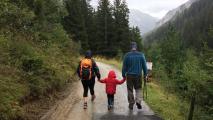Thanks to coronavirus, there may be another public health crisis sweeping the world. Emerging evidence suggests that COVID-19 has created the optimal recipe for child and domestic abuse to thrive. So, advocates and governments are responding with creative ways to offer respite.
In France, the government has promised to pay for hotels for victims of domestic violence during the coronavirus lockdown. They are also opening pop-up counseling centers at grocery stores, because that is where people who are social distancing are still allowed to go. Spain is also providing support in locations that aren’t off-limits.
People in either country who are experiencing domestic abuse can ask a pharmacist for a “Mask 19,” which is a code word created to signal the pharmacist to contact the authorities. And in the U.S., the YWCA of Nashville, which operates a domestic violence shelter, is using RVs to house some of their guests.
Rosemarie Perry won’t be surprised if, when the numbers finally come in, instances of abuse in homes escalated in the past few weeks. As a neurobiologist in the Department of Applied Psychology at New York University, she says that stressful times increase the likelihood of child and domestic abuse. And, with people losing their jobs, struggling to balance new pressures of homeschooling or teleworking, triggers of abuse may be increasingly common. Adding to that, for victims of abuse, being on lockdown means having no escape from the violence.
Already, the UN is reporting that calls to domestic abuse helplines doubled in Malaysia and Lebanon and tripled in China. In France, police officers have received a 36% rise in calls related to domestic violence. And countries all over the world are reporting a similar surge in domestic violence. Secretary-General of the UN, António Guterres, tweeted on Monday, “Today I appeal for peace in homes around the world. I urge all governments to put women’s safety first as they respond to the pandemic.”
Perry says that child abuse is even harder to account for than domestic abuse. Children have less access to phones. And kids who are home from school are less connected to teachers and counselors, despite online homeschooling efforts.
Even before COVID-19, providing support for victims of domestic and child abuse was difficult. Now, with the added challenges of social isolation and economic hardship, advocates need to find creative ways to support people who need it. Many of these people are isolated in their homes. There they are cut off from the safety nets they typically rely on, such as school, after school clubs, shelters, churches, AA support groups, or family.
Some resources are being shifted to web-based platforms, which is something Perry is rushing to provide for families in need. She says that many people, especially low-income families who may have limited access to technology, aren’t aware of the resources that are available online.
Her goal is to fast-track an all-encompassing web platform that aggregates information for homeschooling, reporting abuse, and connecting with support systems. She hopes the site will help slow the likely uptick of child abuse during COVID-19 by keeping kids virtually connected to their support systems.
Perry also says that the COVID-19 pandemic may be creating “empathy bridges,” allowing people to understand the experience of others, such as those that live with financial strain all the time, not just due to the current circumstance.
“Nothing like a population health crisis to make you realize how much we all depend on one another in some way, right,” she says, “How can we come together to build a stronger society?
If you or someone you know is experiencing domestic violence, call or text the National Domestic Violence Hotline at 1-800-799-7233.





